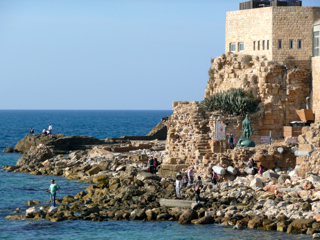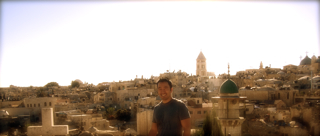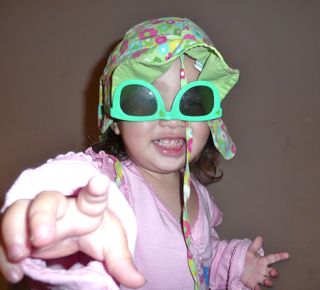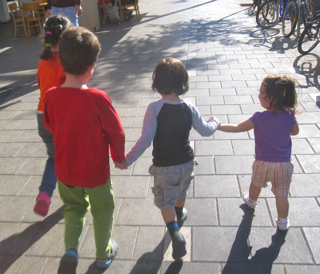In this laden land, one cannot escape the biblical depth and historical breadth that accompany the various sites. A couple weeks ago we went to Jerusalem. Last week, we spent a morning in Caesaria.
When was the era of King Herod? What is the Tower of David? These are the sort of byzantine questions by which I am barraged by my husband. Normally, I start to reply, assuming the familiarity that is supposed to be a part of my culture, then pause, reflect, stammer, and finally stop short, realizing that my knowledge in the matter is sadly and sorely lacking.
When the question of the tower of Babel surfaced the other day I was admittedly thrilled. I pulled my shoulders back, inhaled a cool breath of self-assurance, and started explaining the theme of scattered peoples, diverse languages, and the misunderstandings that ensue.
The idea of language and culture has always been of interest to me. I am a product of two cultures, two languages –- at home in both and not entirely at home in either. The contrast between the two cultures – Canada and Israel – is marked.
“Would you like a massage and a latte with that?” is how Lance describes the everyday encounter with the service industry in “lala-land” (aka Vancouver).
Meanwhile, the saleslady in the cosmetics section of the Super-Pharm insists (almost angrily), while trying to sell us a pricy product, that “she is not Shiseido, she is just trying to help us.”
I am often intrigued by the preeminence of one or another cultural trait in the context of an other milieu. In Canada, I will charge across the street at a red light because, hey look at me, I’m Israeli, I’m no “פרייר” (patsy). While in Israel, as I discovered the other day while astride my bicycle, I yield to traffic when I have a green light.
In our home, both dynamics – Canada and Israel -- are in constant play.
Sebastian, whom we’ll call Canada, asks me to compile lists of his favorite classical Hebrew poets, contemplates the nature of death, and declares that he’d like to study at university – opera, mathematics, and sculpture. He freaks out when we venture a few steps ahead of him and panics at the sight of stray cats because their nails are sharp and scratchy.
“Lech mi-po chatul”(“get out of here cat!) (emphasis on the guttural “lech”), Liliana shouts while flinging her hand abruptly, matching the physical vigor with the vocal command. Physical and vocal is “bul” (precisely) what Liliana is. Inotherwords, Liliana is Israel. Her booming bellows and rollicking laughter can be heard up three flights of stairs.
“Kodem Ani”, “first me”, she insists when it comes to everything. "Day!" ("enough”) she pronounces repeatedly and with increasing animation to the blanket, the fork, and a host of other inanimate objects that don’t bend according to her will. “Matzchik” (“funny”) she informs us when her spoon falls to the floor, and proceeds to infect us with a gurgling laughing fit. And today she surprised me with “nu?” (the mark of the typically Israeli brand of impatience that is loosely translated as “well?!” even as it intimates “come on already”.)
We harbor divided nations in our home, and the result, as may be expected, is sometimes invariably fraught. The two prod each other and recoil in turns. But sometimes, right about when I just about lose it and decide it’s time to intervene and separate the two, a prod is pressed and pushed just a little farther --- and the other suddenly starts laughing. It is fascinating this magical and mysterious point of transformation. I don’t know how to determine or evaluate just where it resides but I do know that it happens when the two parties are enmeshed in contact, and that it is always a welcome and delightful surprise. For the moments that follow the “push beyond”, both cultures are united, sharing the mutual language of giggles.


















































